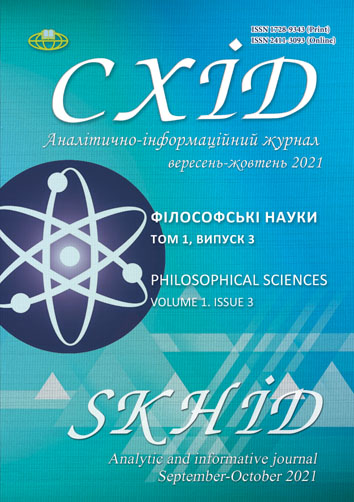HUMANISTIC ASPECTS OF ECOLOGICAL VALUES IN BUDDHISM AND TAOISM AND THEIR SOCIAL SIGNIFICANCE
DOI:
https://doi.org/10.21847/1728-9343.2021.1(3).238928Keywords:
Buddhism, Taoism, culture, karma, ahimsa, ecology, global problemsAbstract
The tendency to seek the harmonization of the relationship between nature and man is as relevant as ever. In the social value discourse, increase in the role of religion and religions in public space encourages religions themselves to become useful to society with their environmental narratives, and society – to be more attentive to their potential. After all, now the answers to the question of how to save humanity without global losses and how to move from a destructive type of development to a regulated one are as relevant as ever. How to mobilize moral and intellectual potential? It is obvious that global problems affect absolutely all segments of the population: Christians and Buddhists, agnostics and atheists. Undoubtedly, these issues concern churches and their spiritual leaders. In the article, the author reveals humanistic aspects of ecological ideas of the East (on the example of Buddhism and Taoism), explains the resource of Buddhist and Taoist environmental wisdom in its heuristic possibilities for today. Relevant guidelines are important for analysis and reflection, at least because they have mentally shaped the ecological culture of its adherents. And as is known, the ecological construct of a number of Eastern countries is recognized in the West as worthy of approval and imitation for the formation of a model of sustainable development and potential establishment of environmentally friendly society. The author focuses not so much on the dogmatic features of the substantiation of Buddhist and Taoist ideas (in tendencies and directions), as on the identification of their common humanistic logic, which can be understood and accepted by Western people (they do not have to become the followers of relevant Eastern doctrines). The researcher also considers the value potential of the worldview cultures in the aspect of sacralization of the rhythms of nature, reverence for its beauty as an image of wise cosmic “industry”. The article implements the disciplinary interaction of religious studies, applied ethics, aesthetic hermeneutics.
Downloads
References
th Dalai Lama (1995). Dalay-lama XIV. Plan mira. Eticheskiy podkhod k okruzhayushchey srede. Put k sebe, 3: 18-47 (in Russian).
Alekseeva, N. (2005). Ekologicheskie aspekty sotsialno-kulturnykh traditsiy Indii. Etnoekologicheskie aspekty dukhovnoy kultury. Мoscow: IEA RAS, p.81-101. (in Russian).
Brady, Е. (2009). Environmental Aesthetics. Encyclopedia of Environmental Ethics and Philosophy. Detroit: Macmillan Reference USA, 1: 313-321.
Brodetskyi, O. (2016). Etychni tsinnosti v relihiiakh: humanistychna synerhiia idei. Chernivtsi: Yuriy Fedkovych Chernivtsi National University; 2016. (in Ukrainian).
Chunda Sutta: Chunda АН 10.176. (2013, November, 03). theravada.ru. http://theravada.ru/Teaching/Canon/Suttanta/Texts/an10_176-cunda-sutta-sv.htm (in Russian).
Dhammasangani (2004). A Buddhist manual of Psychological Ethics. With Introductory Essay and Notes by Caroline A.F. Rhys Davids. The pali text society. Oxford.
Dissanayake, E. (2009). The artification hypothesis and its relevance to cognitive science: Evolutionary aesthetics, and neuroaesthetics. Cognitive Semiotics. 5: 148-173.
Dorzhigushaeva, О. (2013). Ekologicheskaya etika buddizma. Biosfera. №2: 254-272. (in Russian);
Grechishkina, S. (2015). Formation of an ecosophical concept based on Buddhist and Taoist views. Tomsk State University Journal. № 398: 30-34 (in Russian).
Harvey, P. (2013). An Introduction to Buddhism: Teachings, History and Practices . Cambridge, UK: Cambridge University Press.
Keown, D. (2013). Buddhism: A Very Short Introduction. Oxford University Press.
Malinina, E. (2010). Dukhovno-esteticheskiy fenomen «sukhogo» kamennogo sada v prostranstve buddiyskogo khrama. Japan. Almanac. 39: 178 – 191. (in Russian).
Miller, James (2019). Daoism and Ecology: Interview. Creative Arts in Education and Therapy. № 5(2): 113-116. https://ecopoiesis.ru/intervyu/article_post/daosizm-i-ekologiya-intervyu-s-dzhejmsom-millerom (in Russian).
Nizhnikov, S. (2006). Globalnye problemy sovremennosti. In: Philosophy: a textbook for universities. Мoscow: Velbi. (in Russian).
Nyanaponika. Manual of buddhist terms and doctrines. Buddhist publication society. https://www.academia.edu/4482851/Buddhist_Dictionary_by_Venerable_Nyanatiloka;
Rostoshinskiy, Е. (1999). Problema sokhraneniya v filosofii i estestvoznanii. St. Petersburg: University Publishing House. (in Russian).
Rowley, G. (1989). Printsipy kitayskoy zhivopisi. Мoscow: Nauka. (in Russian).
Tao Te Ching. (2005). Gia-fu Feng and Jane English. https://www.wussu.com/laotzu/index.htm
Torchinov, Ye. A. (2018). Buddizm i mirovaya tsivilizatsiya v proshlom i nastoyashchem. studylib.ru https://studylib.ru/doc/3879396/torchinov-e.a.--spbgu---buddizm-i-mirovaya-civilizaciya-v-pr (in Russian).
Toynbee, A.J. and Ikeda, D. (2007). Izberi zhizn. Dialog Arnolda Dzh. Toynbi i Daysaku Ikedy. Мoscow: Moscow University Press. (in Russian).
Yermakova, Т., Ostrovskaya, Ye. (2004). Indiya. Klassicheskiy buddizm. St. Petersburg: ABC-classic, Oriental Studies Petersburg. 2004. (in Russian).
Downloads
Published
How to Cite
Issue
Section
License
Copyright (c) 2021 Iryna Lazorevych

This work is licensed under a Creative Commons Attribution-NonCommercial-NoDerivatives 4.0 International License.
1. Authors bear responsibility for the accuracy of facts, quotations, numbers and names used.
2. Manuscripts are not sent back.
3. The publisher does not always agree with the authors' opinion.
4. The authors reserve the right to authorship of the work and pass the first publication right of this work to the journal under the terms of a Attribution-NonCommercial-NoDerivatives 4.0 International, which allows others to freely distribute the published research with the obligatory reference to the authors of the original work and the first publication of the work in this journal.
5. The authors have the right to conclude separate supplement agreements that relate to non-exclusive work distribution in the form in which it has been published by the journal (for example, to upload the work to the online storage of the journal or publish it as part of a monograph), provided that the reference to the first publication of the work in this journal is included.

